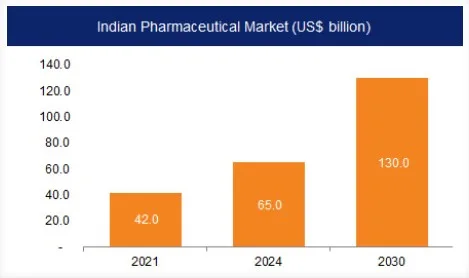Syllabus: GS3/ Economy
Context
- India’s pharmaceutical market for FY 2023-24 is valued at USD 50 billion with domestic consumption valued at USD 23.5 billion and export valued at USD 26.5 billion.
Pharmaceutical Sector of India
- The Pharmaceutical industry in India is the third largest in the world in terms of volume and 14th largest in terms of value.
- Major segments of industry include generic drugs, OTC medicines, bulk drugs, vaccines, contract research & manufacturing, biosimilars and biologics.
- The Pharma sector currently contributes to around 1.72% of the country’s GDP.
- India is the 3rd largest producer of API accounting for an 8% share of the Global API Industry.

Achievements of Pharmaceutical Sector of India
- India accounts for 60% of global vaccine production, contributing up to 70% of the WHO demand for Diphtheria, Tetanus and Pertussis (DPT) and Bacillus Calmette–Guérin (BCG) vaccines, and 90% of the WHO demand for the measles vaccine.
- India supplies over 50% of Africa’s requirement for generics, ~40% of generic demand in the US and ~25% of all medicine in the UK.
- The cumulative FDI equity inflow in the Drugs and Pharmaceuticals industry is US$ 22.52 billion during the period 2000-2024, almost 3.4% of the total inflow received across sectors.
- The nation is the largest provider of generic medicines globally, occupying a 20% share in global supply by volume, and is the leading vaccine manufacturer globally.
- India is known as the “pharmacy of the world” due to the low cost and high quality of its medicines.
Challenges for Pharmaceutical Sector of India
- Intellectual Property (IP) Protection: India’s patent laws, especially concerning compulsory licensing and Section 3(d) of the Indian Patent Act, have led to frequent disputes with multinational corporations.
- Dependence on Imports: APIs and Key Starting Materials (KSMs) import dependence exposes the industry to vulnerabilities related to supply chain disruptions and price fluctuations.
- Skilled Human Resource: Indian pharmaceutical industry requires a highly skilled workforce to drive research and development, manage operations, and ensure quality control.
- Failing the quality tests: The country’s pharma industry has largely been in denial over quality-related concerns expressed by national and international observers.
- According to a Central Drugs Standard Control Organization (CDSCO) survey in 2014-2016, about five per cent of Indian drugs, several of them manufactured by large pharma companies, failed the quality test.
Government initiatives
- The Production Linked Incentive (PLI) scheme for pharmaceuticals is being implemented with a total outlay of Rs. 15,000 crore (US$ 2.04 billion) spanning from 2020-21 to 2028-29.
- Pradhan Mantri Bhartiya Janaushadhi Pariyojana (PMBJP): Quality generic medicines are made available at affordable prices to all through dedicated outlets.
- 100% Foreign Direct Investment (FDI) in the pharmaceutical sector is allowed under the automatic route for greenfield pharmaceuticals.
- The Department of Pharmaceuticals has set up seven National Institutes of Pharmaceutical Education & Research (NIPERs) as institutes of national importance, which conduct high end research in various pharma specializations.
- The government has framed a “National Policy on Research & Development and Innovation in the Pharma-MedTech Sector in India” in 2023 to encourage R&D in pharmaceuticals and medical devices.
- Patents rules : Since 2014, Patents Rules have been amended several times to streamline and simplify filing and processing of patent applications, remove irregularities, redress procedural delays, and complexities in patent granting procedure.
- Start-Ups Intellectual Property Protection (SIPP) scheme facilitates protection of Patents, Trademark and Designs by interested Startups, and all Indian innovators using the services of the Technology and Innovation Support Centers (TISCs) established in India.
Way Ahead
- The pharmaceutical industry in India is a significant part of the nation’s foreign trade and offers lucrative potential for investors.
- Speedy introduction of generic drugs into the market has remained in focus and is expected to benefit the Indian pharmaceutical companies.
- In addition, the thrust on rural health programmes, lifesaving drugs and preventive vaccines also augurs well for the pharmaceutical companies.
| New Drugs and Clinical Trials Rules, 2019 – Disposal of clinical trial and new drug applications by way of approval or rejection or seeking further information within a period of 90 days. – In case of application to conduct clinical trial of a new drug or investigational new drug as part of drug discovery, research and manufacture in India, the application is to be disposed of within a period of 30 days. – Provisions for accelerated/ expedited approval process in certain situations like unmet need, orphan drugs for rare diseases etc. – Provisions for pre-submission and post submission meetings of the applicants with CDSCO for formal discussion and case specific regulatory pathway. |
Source: PIB
Previous article
Government Ends No-Detention Policy
Next article
India’s Crude Oil Reserves